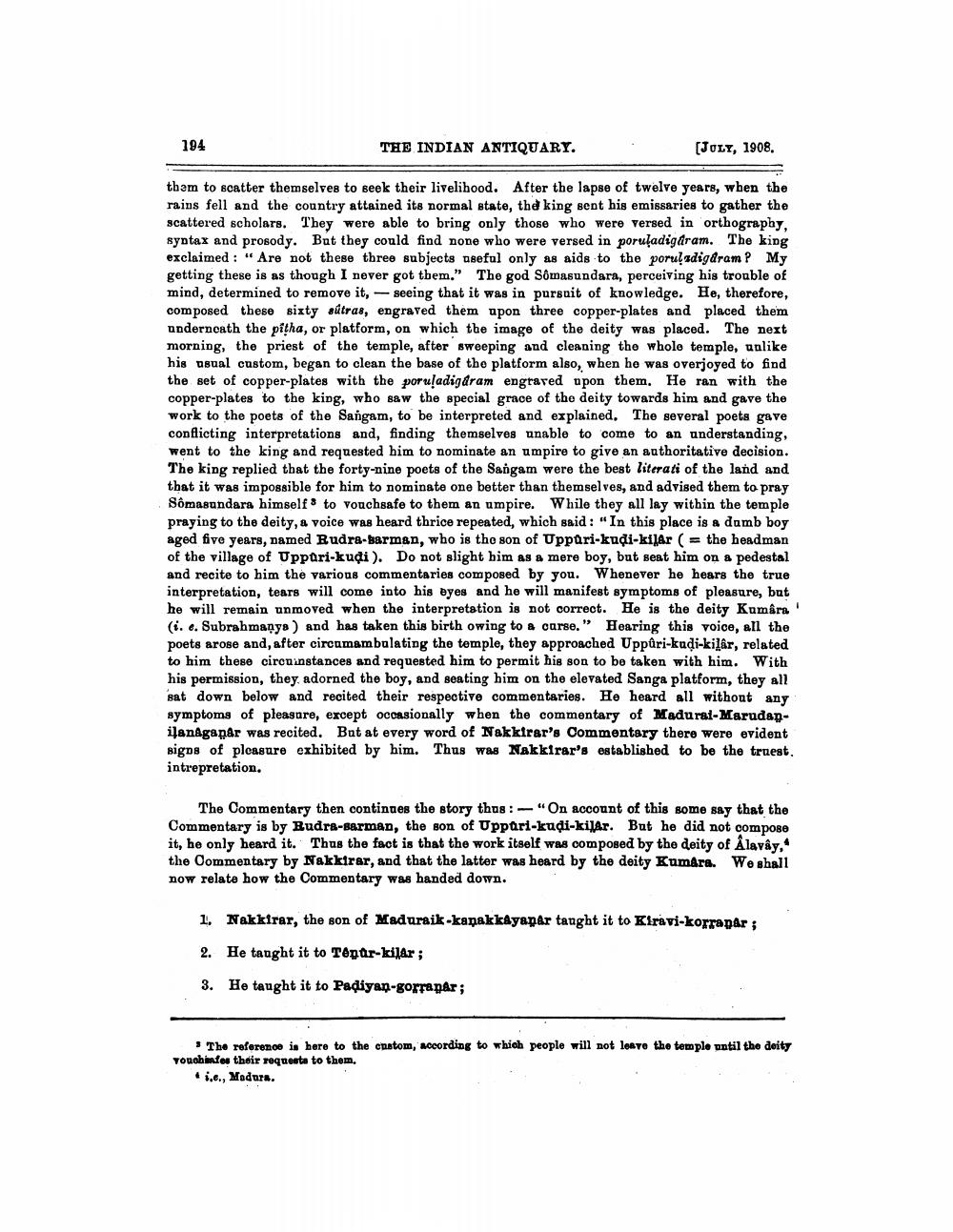________________
194
THE INDIAN ANTIQUARY.
(JOLY, 1908.
them to scatter themselves to seek their livelihood. After the lapse of twelve years, when the rains fell and the country attained its normal state, the king sent his emissaries to gather the scattered scholars. They were able to bring only those who were versed in orthography, syntax and prosody. But they could find none who were versed in poruladigaram. The king exclaimed: "Are not these three subjects useful only as aids to the porul adigdram? My getting these is as though I never got tbem." The god Somasundara, perceiving his trouble of mind, determined to remove it, - seeing that it was in pursuit of knowledge. He, therefore, composed these sixty stras, engraved them upon three copper-plates and placed them anderncath the pitha, or platform, on which the image of the deity was placed. The next morning, the priest of the temple, after sweeping and cleaning the whole temple, unlike his usual custom, began to clean the base of the platform also, when he was overjoyed to find the set of copper-plates with the poruladigaram engraved upon them. He ran with the copper-plates to the king, who saw the special grace of the deity towards him and gave the work to the poets of the Sangam, to be interpreted and explained. The several poets gave conflicting interpretations and, finding themselves unable to come to an understanding, went to the king and requested him to nominate an umpire to give an authoritative decision. The king replied that the forty-nine poets of the Sangam were the best literate of the land and that it was impossible for him to nominate one better than themselves, and advised them to pray Sômasandara himself to vouchsafe to them an umpire. While they all lay within the temple praying to the deity, a voice was heard thrice repeated, which said: "In this place is a damb boy aged five years, named Rudra-Barman, who is the son of Uppuri-kudi-ki Ar (= the headman of the village of Uppari-kuļi). Do not slight him as a mere boy, but seat him on a pedestal and recite to him the various commentaries composed by you. Whenever he hears the true interpretation, tears will come into his eyes and he will manifest symptoms of pleasure, but he will remain unmoved when the interpretation is not correct. He is the deity Kumara' (i. e. Subrahmanya) and has taken this birth owing to a carse." Hearing this voice, all the poets arose and, after circumambulating the temple, they approached Uppûri-kudi-kilár, related to him these circuinstances and requested him to permit his son to be taken with him. With his permission, they adorned the boy, and seating him on the elevated Sanga platform, they all sat down below and recited their respective commentaries. He heard all without any symptoms of pleasure, except occasionally when the commentary of Madurai-MarudanifanAgapar was recited. But at every word of Nakkirer's Commentary there were evident signs of pleasure exhibited by him. Thus was Nakkirar's established to be the truest. intrepretation,
The Commentary then continues the story thus: - "On account of this some say that the Commentary is by Budra-Barman, the son of Uppari-kudi-kilar. But he did not compose it, he only heard it. Thus the fact is that the work itself was composed by the deity of Alavây, the Commentary by Nakkirar, and that the latter was heard by the deity Kumara. We shall now relate how the Commentary was handed down.
1. Nakkirar, the son of Maduraik-kanakkayapar taught it to Kiravi-korrapar;
2. He taught it to Tepur-kilar;
3. He taught it to Padiyan-gorranar;
* The reference is here to the custom, according to which people will not leave the temple until the deity vouches their requests to them.
1.6., Madura.




